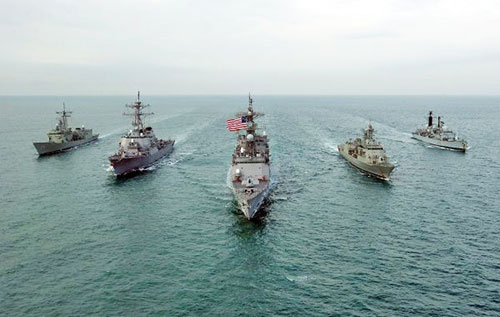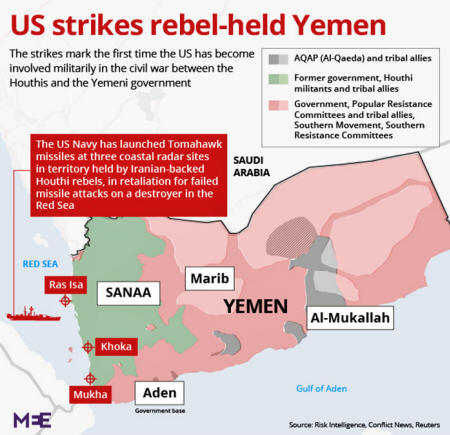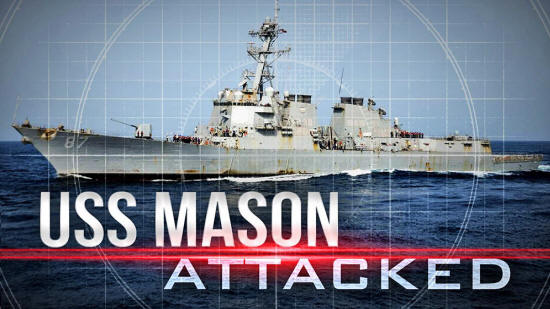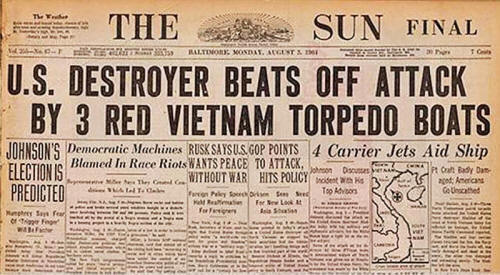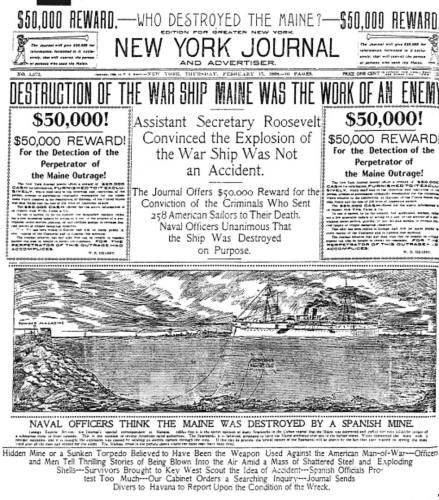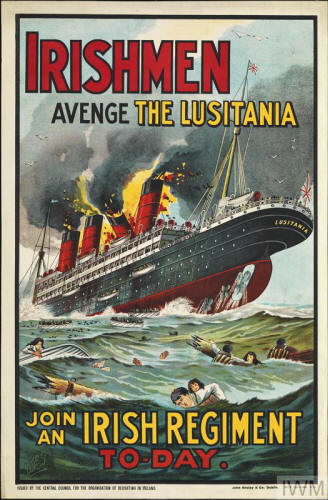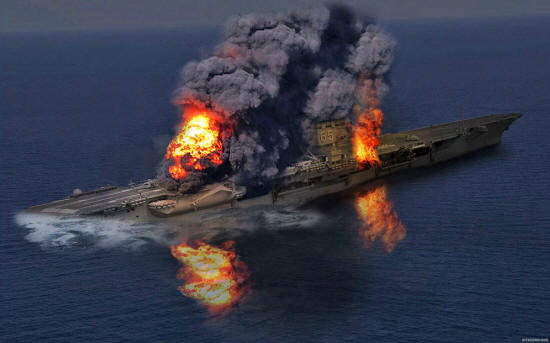|
As you may have read at the time, the U.S. entered the war in Yemen earlier this month (October 2016) with a volley of cruise missiles that destroyed three radar sites in Houthi-controlled territory of the embattled state.
The reason given for these strikes? Self-defense, of course...
As Obama explained in a letter to Congress on October 14th:
In other words a trio of 'poor', 'innocent' U.S. peace boats came under a vicious surprise attack as they were peacefully minding their own business on a peace mission spreading peace and love in the Red Sea, and were forced against their will into fighting back… or something like that...
To be clear, this incident is by no means the first example of U.S. involvement in the conflict between Saudi Arabia and the Houthi rebels in Yemen.
Recently revealed documents show that the U.S. government's own lawyers worried that a $1.3 billion arms sale to the Saudis last year would make the U.S. co-belligerents in the war and thus legally responsible for Saudi war crimes in the bloody conflict.
In fact, rumors of much deeper American involvement in the war, far beyond the mere logistical support they have supposedly been giving the Saudi Air Force, have been floating around the independent media since the conflict began.
But to actually begin firing on Houthi targets in Yemen with U.S. weapons from U.S. boats represents a worrying escalation.
With the whole region on edge, another incident risks propelling the U.S. into yet another bloody sectarian war in yet another dangerously unstable Middle Eastern nation.
Into this volatile mix came worrying news:
Now at this point you might be questioning (as Kit at OffGuardian does), why the Houthis have suddenly decided to massively escalate their ongoing duel to the death with the Saudis by drawing in the United States.
As Kit puts it:
Yes, it certainly would be strange if the Houthis suddenly began an all-out assault on the world's military superpower two years into a heated conflict with their neighbor.
That is to say, it would be strange if that attack had actually happened.
Which it didn't. Of course...
Propaganda ca. 2016
The official story:
Notice the words "believed to be" in that last sentence?
The Pentagon hopes you didn't, because, as it turns out, they're not so sure now.
As USNI News reported last week, the Pentagon is "still unsure" if the Mason was actually attacked at all on the 15th.
So the sudden increase in attention on Yemen and the sudden increased U.S. support for the Saudis' devastating, war-crime laden war there is down to an incident that didn't even happen. Again...
Does this sound familiar? It should.
This is exactly how the United States became (officially) embroiled in the Vietnam war.
Propaganda ca. 1964
The official story:
Of course, it was later revealed that the official story had been (you guessed it!) a tissue of lies...
The Maddox was not peacefully drifting near Vietnamese waters, minding its own business; it was part of a covert naval squadron launching attacks on the North Vietnamese.
On August 2nd, it had fired a volley of shots when the Vietnamese approached, a fact omitted from the official report (which maintained that Charlie fired first).
And the August 4th attack? It never happened at all. That's not conjecture, that's the official conclusion of the NSA's own internal publication, made available to the public for the first time 40 years after the non-incident itself.
Now the story of the Gulf of Tonkin (or this month's altercation in the Red Sea) will not be surprising to those immersed in the history of America's naval engagements.
Sadly, history is replete with framed up, ginned up, or just plain made up naval incidents to get the U.S. public behind war.
In 1898 the U.S. drummed up support for the Spanish-American War by pretending that the USS Maine had been blown up by the dastardly Spaniards while it was peacefully minding its own business in Havana Harbor.
William Randolph Hearst, the subject of Citizen Kane's satirical gaze and the father of yellow journalism, contributed to the cause by fabricating hysteria over the incident:
Remember the Maine and To Hell With Spain
The McKinley Administration set up a naval board to "study" the incident, and to the surprise of absolutely no one concluded that the Maine explosion was the result of an external mine.
In reality it was almost certainly a coal bunker fire that caused the ship's magazines to ignite, but the warmongers got what they wanted:
In 1915 the RMS Lusitania, a British ocean liner en route from New York to Liverpool, was sunk by a German U-boat 11 miles off the coast of Ireland.
Propaganda ca. 1915
The ship's sinking, which resulted in the death of 128 of the 139 Americans aboard, became a symbol of German evil and helped prepare the U.S. public for eventual entry into WWI.
Once again, every facet of the story as presented to the public was a deliberate lie or a lie by omission.
The boat was not a purely civilian vessel carrying 3,813 40-pound (unrefigerated) containers of "cheese" and 696 containers of "butter," as the official manifest held, but guncotton, in keeping with the shipment's stated destination:
It was not sunk by the German torpedo boat but secondary explosions from the munitions the ship was (illegally) carrying.
It was not the victim of a cowardly German surprise attack (the German Embassy placed a warning notice about the Lusitania in 50 American newspapers right next to Cunard's own listings).
And the American ambassador to England at the time, Walter Hines Page, wrote to his son five days before the ship was sunk, asking:
So what did the official cover up conclude?
That the dastardly Germans had waged a perfidious sneak attack on an innocent peace boat, of course.
The Pearl Harbor attack, too, was a deliberate attack by an enemy power, but just like the sinking of the Lusitania the American public knows almost nothing about the real story of that attack.
It isn't just that the Roosevelt administration deliberately and methodically provoked Japan into an attack (which they documentably did), they actively aided the Japanese in that attack.
In 1940 Roosevelt personally ordered the Pacific Fleet to relocate to Pearl Harbor over the angry objections of U.S. Fleet Commander Admiral J.O. Richardson.
Richardson warned that the fleet would be sitting ducks at that location and vulnerable from 360 degrees to a Japanese attack, but Roosevelt overruled him and, four months later, relieved him of his command.
We now know there were multiple methods by which the U.S. knew of the attack in advance and that various officials in the chain of command deliberately stood down and allowed the attack to proceed.
And on December 7, 1941, after yet another chance to expose the plot and warn Pearl Harbor was sabotaged by Chief of Staff General Marshall, Roosevelt had his "day of infamy" and the U.S. was embroiled in WWII.
With all of that history taken into account, it's especially chilling to read "Unsolicited Advice to the Government of Iran," a 2007 open letter to Iran from former Senator Gary Hart. Yes, that Gary Hart...
Just read the opening lines:
Senator Hart may be many things, but he is not a stupid man. He knew exactly what message he was sending by referring to the Maine and the Gulf of Tonkin as examples of how the U.S. is drawn into war.
His subtext is clear: do as we say or we will blow something up in the Persian Gulf and blame it on you.
Do you think that was an idle threat? It absolutely wasn't.
We now know that just months after Hart's letter was published, in the wake of a January 2008 incident in the Strait of Hormuz between Iranian speedboats and U.S. warships, then-Vice President 'Dick' Cheney convened a meeting with high-ranking naval officials with one specific question in mind:
One suggestion they kicked around at that meeting:
If Cheney's 2008 meeting had come to the conclusion that a naval false flag was the best way to kick start the war with Iran that the neocon hawks had been lusting after since the fall of Saddam, then it is debatable whether we'd even still be here to talk about that decision.
Now think about any number of flashpoints around the world, from the South China Sea to the Red Sea, and how a naval false flag could draw the U.S. (and the world) into all-out war. It's as simple as problem, reaction, solution.
If this latest Yemeni incident surprises in any way, it is only that the U.S. hasn't passed a "Red Sea Resolution" that justifies a full-scale invasion of Yemen as revenge for the ignoble perfidy of those dastardous Houthis. (If only Hearst was still around! "Remember the seamen and to hell with Yemen!"...)
All of which just goes to prove the old adage:
Plus ça change…
|


